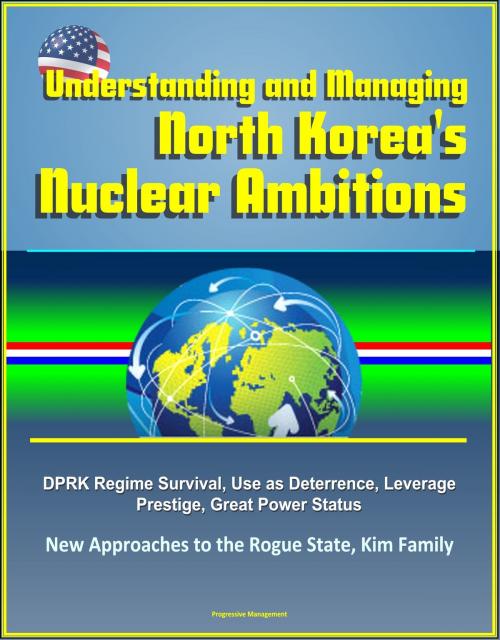Understanding and Managing North Korea's Nuclear Ambitions: DPRK Regime Survival, Use as Deterrence, Leverage, Prestige, Great Power Status, New Approaches to the Rogue State, Kim Family
Nonfiction, History, Military, Nuclear Warfare, Asian, Asia| Author: | Progressive Management | ISBN: | 9781370146086 |
| Publisher: | Progressive Management | Publication: | March 29, 2017 |
| Imprint: | Smashwords Edition | Language: | English |
| Author: | Progressive Management |
| ISBN: | 9781370146086 |
| Publisher: | Progressive Management |
| Publication: | March 29, 2017 |
| Imprint: | Smashwords Edition |
| Language: | English |
This excellent report has been professionally converted for accurate flowing-text e-book format reproduction. The February 2007 agreement reached with North Korea to shut down its nuclear reactor and give up its nuclear weapons program was heralded by many as a significant breakthrough following the shock of North Korea's nuclear weapons test in October of the previous year. This optimistic assessment, however, fails to consider the significant hurdles that will confront negotiators as they attempt to fulfill the promise of the February accord. The North Korean regime's 'hierarchy of nuclear motivations' including its perception of the security, leverage and prestige offered by the possession of nuclear weapons as well as the significant time and energies it has invested in developing a nuclear device, make an actual verifiable dismantling of this program unlikely.
Further, the historical tendency for negotiations with North Korea to produce few positive results bodes ill for future success. Extant hurdles are further compounded by a U.S. negotiation position that heightens North Korea's security concerns, leaves little room for compromise, and has, unwittingly, encouraged North Korea's development of nuclear weapons. Without some unforeseen and dramatic change in position by either side, the ongoing negotiations regarding North Korea's nuclear weapons program are unlikely to succeed in the near term. The best hope lies in gaining a complete understanding the North Korean position and developing a flexible strategy of engagement and containment. Such a strategy could address the security concerns of the Kim regime while limiting North Korea's ability to proliferate nuclear technology and providing security for the U.S. and its allies. Such an approach, however, would likely require the U.S. to set aside, at least temporarily the potentially costly and unrealistic goal of North Korean denuclearization.
Without some unforeseen and dramatic change in the position on either side, the ongoing negotiations regarding North Korea's nuclear weapons program are unlikely to succeed in the near term. The best hope for the United States lies in developing a thorough understanding the North Korea's rationale for developing nuclear weapons and developing a flexible strategy of engagement and containment that addresses the DPRK's concerns while continuing to provide security for the U.S. and its allies and limiting North Korea's ability to proliferate nuclear technology. Such a strategy may require that the U.S., for the moment, set aside the potentially costly and unrealistic goal of North Korean denuclearization until such a time as more favorable environment presents itself.
This excellent report has been professionally converted for accurate flowing-text e-book format reproduction. The February 2007 agreement reached with North Korea to shut down its nuclear reactor and give up its nuclear weapons program was heralded by many as a significant breakthrough following the shock of North Korea's nuclear weapons test in October of the previous year. This optimistic assessment, however, fails to consider the significant hurdles that will confront negotiators as they attempt to fulfill the promise of the February accord. The North Korean regime's 'hierarchy of nuclear motivations' including its perception of the security, leverage and prestige offered by the possession of nuclear weapons as well as the significant time and energies it has invested in developing a nuclear device, make an actual verifiable dismantling of this program unlikely.
Further, the historical tendency for negotiations with North Korea to produce few positive results bodes ill for future success. Extant hurdles are further compounded by a U.S. negotiation position that heightens North Korea's security concerns, leaves little room for compromise, and has, unwittingly, encouraged North Korea's development of nuclear weapons. Without some unforeseen and dramatic change in position by either side, the ongoing negotiations regarding North Korea's nuclear weapons program are unlikely to succeed in the near term. The best hope lies in gaining a complete understanding the North Korean position and developing a flexible strategy of engagement and containment. Such a strategy could address the security concerns of the Kim regime while limiting North Korea's ability to proliferate nuclear technology and providing security for the U.S. and its allies. Such an approach, however, would likely require the U.S. to set aside, at least temporarily the potentially costly and unrealistic goal of North Korean denuclearization.
Without some unforeseen and dramatic change in the position on either side, the ongoing negotiations regarding North Korea's nuclear weapons program are unlikely to succeed in the near term. The best hope for the United States lies in developing a thorough understanding the North Korea's rationale for developing nuclear weapons and developing a flexible strategy of engagement and containment that addresses the DPRK's concerns while continuing to provide security for the U.S. and its allies and limiting North Korea's ability to proliferate nuclear technology. Such a strategy may require that the U.S., for the moment, set aside the potentially costly and unrealistic goal of North Korean denuclearization until such a time as more favorable environment presents itself.















